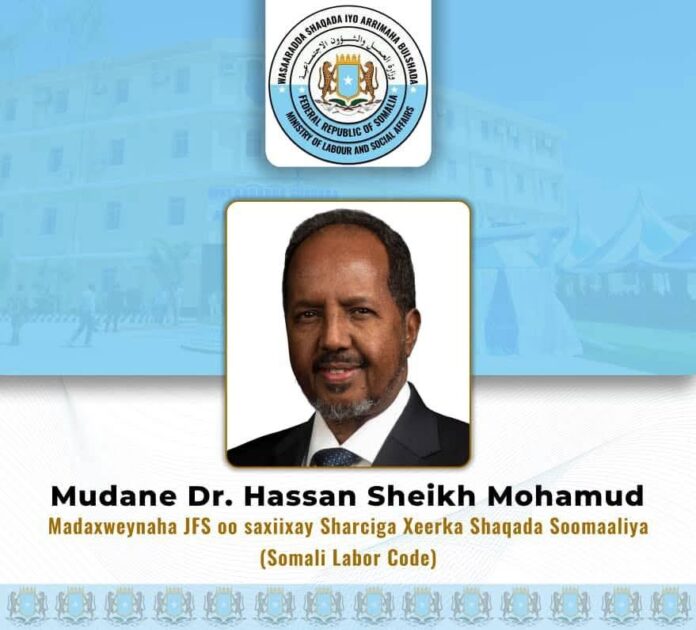Somali President Hassan Sheikh Mohamud has signed a new Labour Code, aligning with international standards and marking a pivotal step in addressing workers’ rights while fostering a more equitable labour environment in the country.
After 52 years of stagnation, the legislation, signed by President Mohamud, signals a significant shift toward aligning Somali labour law with International Labour Organization (ILO) standards. This new law is viewed as a crucial advancement in protecting workers’ rights and promoting fairer labour practices across Somalia.
The revised Labour Code follows years of advocacy and negotiation led by the Federation of Somali Trade Unions (FESTU), in close collaboration with the Ministry of Labour and Social Affairs and the Somali Chamber of Commerce and Industry (SCCI).
The legislation is the result of productive social dialogue between workers, employers, and the government, with FESTU playing a central role in pushing for the integration of international labour standards.
The law integrates ILO Conventions, ensuring global best practices on health, safety, wages, anti-discrimination, and dispute resolution, while also strengthening protections for workers in Somalia’s informal sector.
FESTU, a key advocate for the reform, has hailed the legislation as a major victory for Somali workers. Representing a wide range of workers across various sectors, the trade union has been instrumental in advocating for these critical changes.
The organisation is now focused on ensuring the law’s effective implementation and enforcement. With the new code in place, FESTU aims to raise awareness among Somali workers about their rights and ensure they can access the protections the law provides.
“This is a landmark achievement for Somalia,” said Omar Faruk Osman, General Secretary of FESTU. “For too long, workers in our country lacked the legal protections they needed.”
Osman added that the new Labour Code will go a long way in ensuring fair treatment, improving working conditions, and promoting economic inclusion.
The enactment of this law comes at a time of broader economic reforms in Somalia, as the country continues to rebuild and modernise after decades of conflict. This overhaul is seen as an important step in improving Somalia’s overall business climate, balancing the interests of workers and employers.
The law’s passage is a victory for social dialogue, showcasing collaboration between trade unions, government, and the private sector. It positions Somalia alongside countries prioritising workers’ rights, aiming to protect workers, drive economic growth, and attract investment by creating a fairer, more predictable labour market.
Somalia’s move to modernise its labour laws is a key step in the country’s efforts to rebuild and integrate into the global economy, address workforce challenges, and meet international labour standards.







